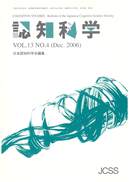Volume 13, Issue 4
Displaying 1-9 of 9 articles from this issue
- |<
- <
- 1
- >
- >|
Foreword
-
2006Volume 13Issue 4 Pages 495-496
Published: 2006
Released on J-STAGE: November 13, 2008
Download PDF (396K)
Tributes to Dr. Masanao Toda
-
2006Volume 13Issue 4 Pages 497-498
Published: 2006
Released on J-STAGE: November 13, 2008
Download PDF (413K) -
2006Volume 13Issue 4 Pages 498-500
Published: 2006
Released on J-STAGE: November 13, 2008
Download PDF (666K) -
2006Volume 13Issue 4 Pages 501-511
Published: 2006
Released on J-STAGE: November 13, 2008
Download PDF (967K)
Research Paper
-
2006Volume 13Issue 4 Pages 512-522
Published: 2006
Released on J-STAGE: November 13, 2008
Download PDF (727K)
Literature Guide
-
2006Volume 13Issue 4 Pages 523-526
Published: 2006
Released on J-STAGE: November 13, 2008
Download PDF (653K)
Book Reviews
-
2006Volume 13Issue 4 Pages 527-530
Published: 2006
Released on J-STAGE: November 13, 2008
Download PDF (622K) -
2006Volume 13Issue 4 Pages 531-532
Published: 2006
Released on J-STAGE: November 13, 2008
Download PDF (584K)
Presentation Awards
-
2006Volume 13Issue 4 Pages 547-550
Published: 2006
Released on J-STAGE: November 13, 2008
Download PDF (793K)
- |<
- <
- 1
- >
- >|
